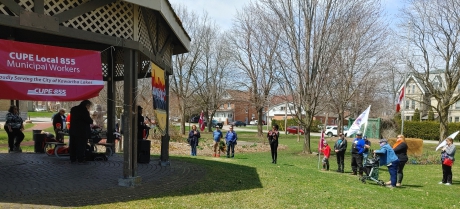Reports
You are here
Mourn the dead, Fight like hell for the living!

April 26, 2022
On April 28 each year, workers in Canada and internationally commemorate a day in remembrance of their Sisters and Brothers injured or killed on the job.
In Canada, April 28 is called the Day of Mourning. The tradition began in 1983 when two Canadian Union of Public Employees (CUPE) health and safety reps came upon a funeral of a firefighter killed on the job. They resolved to take this to CUPE’s convention, and to pass a motion that a day be devoted to those who suffered a workplace injury, or those who died while working for their employer. Such a motion was passed by CUPE, and the Canadian Labour Congress quickly followed suit at its next convention. April 28th was selected as this was the day Canada’s first Compensation Act passed its 3rd reading in 1914.
While many will light candles in ceremony on that day, another symbol is also used to denote the importance of health and safety on the job – the Canary in the Mine. The Canary in the Mine dates back to the UK in 1911, when miners began to take canaries in a cage down with them into the mines. The canaries were used to indicate the presence of carbon monoxide – they would collapse and die when it was present. Due to their small size and rapid breathing rate, the carbon monoxide would affect them immediately, giving the miners time to escape.
The symbol of the canary, in the cage of the workplace, is a haunting image. It is a reality of front line workers everywhere. If you look at those killed on the job, or those that die subsequently of their injuries, we are looking at a rate of almost 3 a day (995). Reported injuries are over 30,000 a year – likely the tip of the iceberg, as many workers are not covered the provincial Workers Safety and Insurance Boards, but by private insurance that may have different reporting methods, not to mention lower levels of compensation, if any.
These solemn memorials, observed this week all over Canada, are indeed a condemnation of a system that sends workers to work every day, but does not return them to their homes and their loved in the same condition, or at all. Many in notoriously dangerous industries such as mining or construction, or in our understaffed and over populated healthcare facilities, where violence against staff members has reached epidemic levels, understand this only too well.
Provinces often have legislation that allows for the right to refuse unsafe work, an important gain for the labour movement. But it is hard to enforce when you don’t have a union, and risk being fired for doing so. Or when a worker representative on a mandatory joint health and safety committee is not sent, at the employer’s expense, for training that would allow them to investigate, and put a stop to workplace hazards or dangerous practices.
There has been a strong response to recent tragedies, such as the 26 Westray Mine workers, killed in 1992, in Nova Scotia; or the Metron disaster in Toronto, when a boom near the top of a high rise collapsed, killing 4 workers, grievously injuring 1; or at Fiera Foods, also in Toronto, where 5 workers have died on the job since 1999 – all events that took place in non-union workplaces. Many in the labour movement such as the United Steelworkers have demanded justice that fits the crime: kill a worker, go to jail. We need to organize and use our force as workers to make this happen, to put bosses behind bars.
So on April 28, we must mourn our dead, and fight like hell for the living - and fight like hell for a system that puts people’s lives over the carnage of capitalist profit.
Section:










